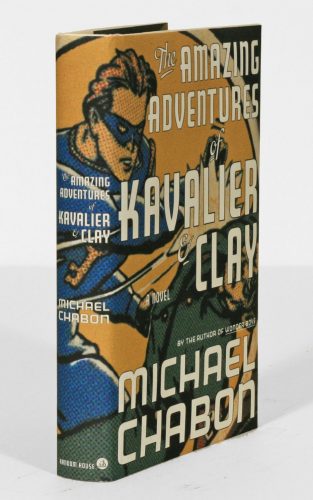With summer upon us and coronavirus lingering in the air, I bring to you a new season’s installment of the reading list series! The public library in Iowa City remains closed, and so I’ve had to get creative about where I find materials. In some cases, I’m reading some things on my shelf I put there years ago.
Without further ado, here are 5 books I’ve recently read.
Michael Chabon – The Amazing Adventures of Kavalier & Clay
I first read this in college, and it put me on a path toward reading many Chabon books. About 15 years later, I’m reading it again. There’s really a lot to love here: its grounding in early pulp material, the exploration of sci-fi themes, and Hitler getting punched in the face by a comic book character.
Ultimately, the book’s strength flows from the fact it’s about two Jewish New York kids growing up during World War II. One of the kids – Kavalier – moves to New York from Czechoslovakia. He writes comics to do his part to defend European Jews from the Nazis – his family among them.
James S.A. Corey – Tiamat’s Wrath
Alright, I’m cheating a bit here. I haven’t read this one yet, but it’s coming up soon on my list. This is Book 8 of The Expanse, a sci-fi series by two authors taking up the joint pen name James S.A. Corey. The basic premise? A few hundred years in the future, humanity expands to occupy the solar system and has its first encounter with an alien intelligence via their bio-war materials. Humanity uses the materials to open gates to – and settle – more than a thousand star systems.
As of the end of Book 7, an anti-Earth empire from one of the settlements has conquered most of the known galaxy and captured one of the main characters. I’m ready for Book 8 and – even more so – the conclusion of the series with Book 9.
Maxim Gorky – The Zykovs
This is a play rather than a novel. And I read it in a collection featuring The Lower Depths. But The Zykovs has merit of its own. Like The Lower Depths, it’s from the pre-Soviet period of his work. And like much of his work from this period, it’s about Russians struggling through life in the most Russian of ways. He writes about Russian peasants and small businessmen – larger-than-life businessmen in The Zykovs – in both critical and sympathetic ways. He does so here – as with much of his pre-Soviet work – with an attitude of near reverence for ‘Russian culture.’
David Harvey – The Limits to Capital
The greatest compliment I’ll pay to David Harvey – or to any Marxist scholar – is that I’ve learned a ton about Marx from him. Harvey’s great skill is that he explains Marx’s methods and conclusions in clear language without distorting or short-changing the work itself. Nor does Harvey treat Marx as a saint. He clearly tells us where Marx fell short or incomplete.
Harvey’s a Marxist geographer, one of the first and best. He wrote The Limits to Capital in the early 1980s. The core project was an application of Marxism to a spatial analysis of capitalism, particularly urbanization and the development of cities. But along the way, Harvey clearly explains Marx’s dialectical methods in Capital and the key points of Marx’s analysis. While that might sound simple, any of you who have attempted to read Capital knows it ain’t.
Labor Notes – Secrets of a Successful Organizer
This is a book on organizing written by the publishers of the monthly magazine Labor Notes. It’s a handy and accessible guide for basic organizing, but it’s useful for just about anyone. Lots of people call themselves ‘activists’ or ‘organizers,’ but much of what people do by those names amounts to something more like advocacy or mobilization. Labor Notes puts conversations with co-workers and fellow tenants – not just ‘fellow activists’ – at the center of the work. That’s exactly where it should be. They also discuss leadership development and distinguish it from self-promotion.
My advice? You should read this book alongside Jane McAlevey’s book No Shortcuts. I wrote about McAlevey’s book earlier. While they’re broadly similar, McAlevey focuses on case studies while Labor Notes focuses on practical advice.
Reading List Series
As I mentioned, I’ve been doing a reading list series for some time. Here are the others.
Summer 2019: Part 1 and Part 2
Winter 2020
Spring 2020
Stay-at-Home
